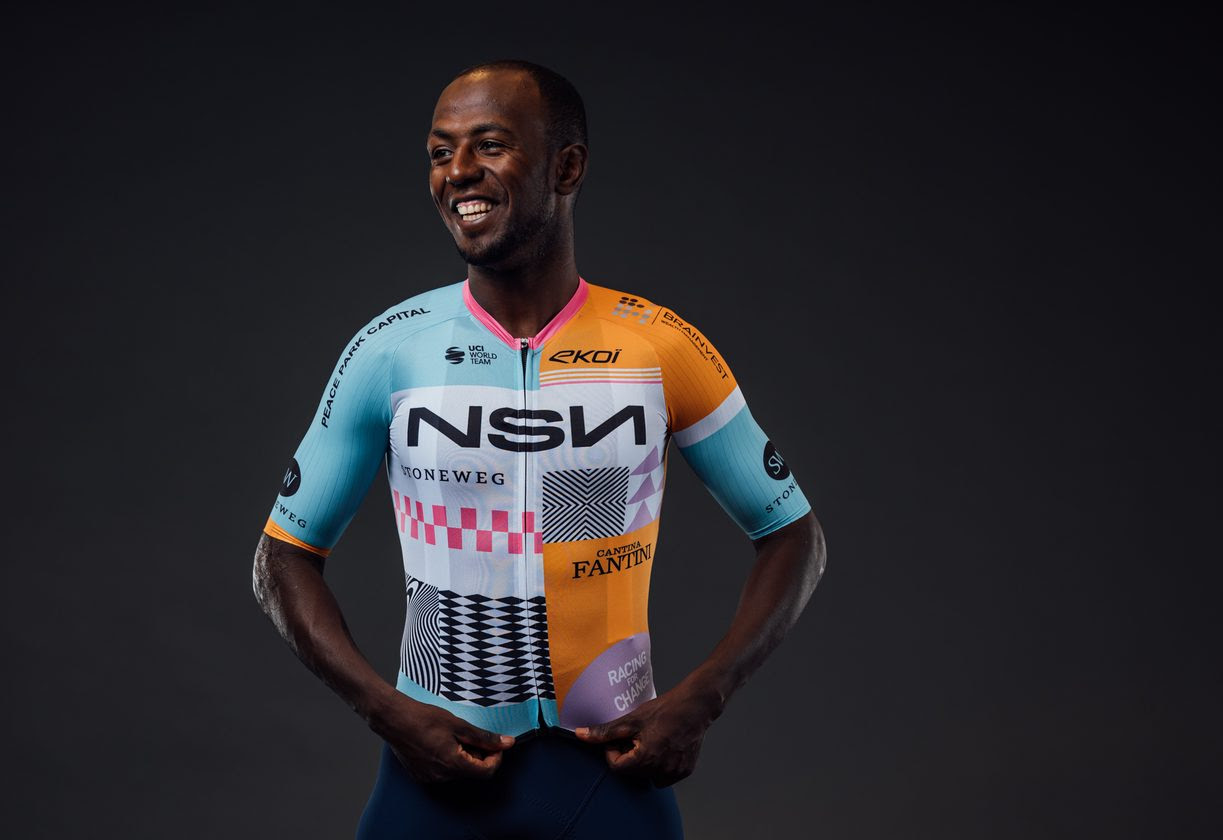Build it and they will come: The Pegasus fallacy
Lifting the lid on the project's financial stability
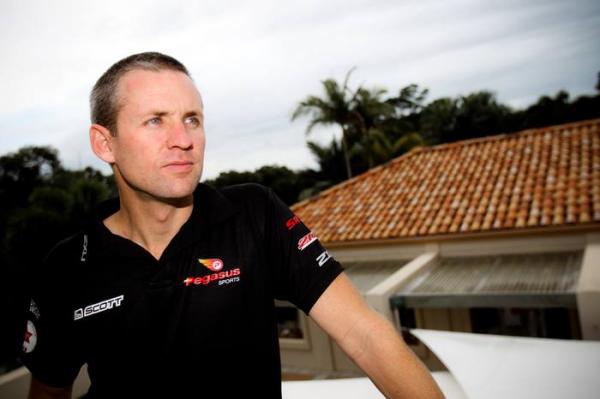
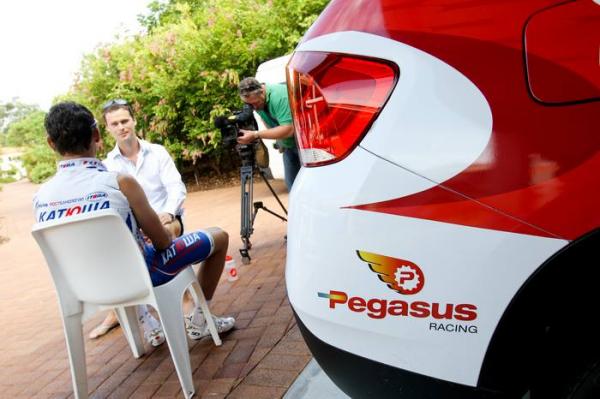
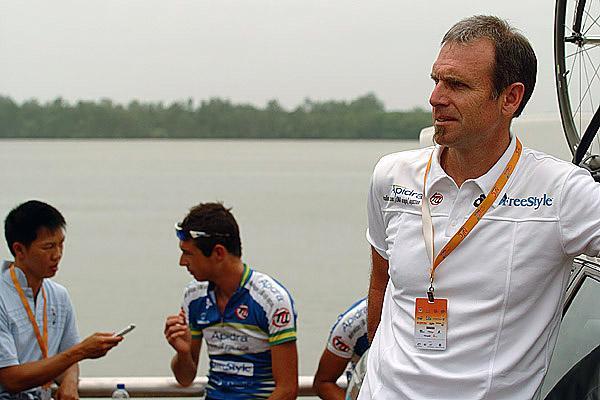
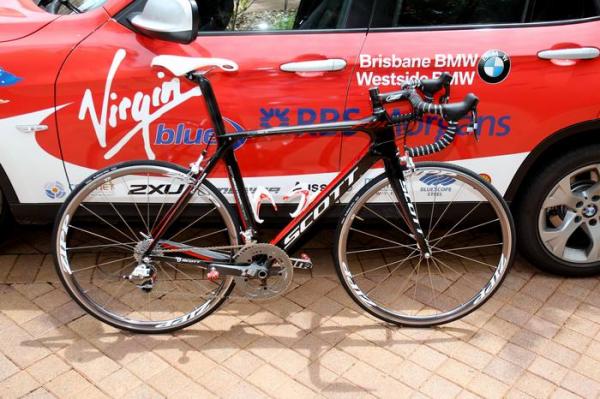
To the casual observer, Fly V Australia was a team on a rapid trajectory. A trans-Pacific Continental outfit, with the backing of a Richard Branson airline, invitations to the Tour of California for two successive years, a glut of race wins, an Australian domestic and women's program to aid development and growth within the sport. It seemed a natural progression that if there was a team which could then go on to produce Australia's first ProTour squad, Fly V, run by Pegasus Racing was surely it.
Pegasus in ProTour: Application encountered a glitch
White refuses to give up on Pegasus despite missing ProConti licence
Pegasus licence denied because of lack of financial guarantees
Pegasus Sports hits back at UCI
Dreams turn to dust for Pegasus Sports
Twelve months on, Pegasus finally goes up in smoke
Vogels keen for a fresh start after rollercoaster three years with Pegasus
Then 12 months ago the Pegasus project was in tatters. The UCI rejected their application for a ProTeam or Professional Continental licence and lambasted team management for being "rather unprofessional" in a two-page communiqué. Following the revelation by Cyclingnews late last month that the remaining Continental team had lost the financial support of airline V Australia, we expose some of the misnomers behind this fascinating chapter of cycling history.
Coming to America
As a first race, Fly V Australia-Successful Living went big and took on the Tour of California in February 2009. One rider of the eight-man line-up, Ben Day, would finish the nine-stage race. But this was a team that was different, according to Andrew Messick, then President of AEG Sports and race director.
"I was really impressed with Chris' [White, Pegasus Racing Managing Director and Fly V Australia CEO] vision and what he was trying to accomplish and the kind of team he was trying to build and the kind of riders that he was trying to attract," Messick explained to Cyclingnews. "We were happy to have them be a part of the race and they had a good go.
"Part of what made the partnership work particularly well was the fact that V Australia at that point was committed to trying to bring a higher profile to the team and they were excited, and they wanted to activate, and they were eager and keen to help showcase the team's participation at our event – and we liked that."
Despite an unremarkable start under a bright spotlight, Fly V Australia went on to take stage wins at the Tour of the Gila, Tour of Elk Grove, Hanes Park Classic and Downers Grove and for season 2010, recruited Ed Beamon as its new technical director. Another invitation for the Tour of California followed, the team later finished at the top of the NRC table but the talk was, that Fly V Australia would aim for Pro Continental status for 2011. By mid-August the goal posts had shifted and White announced that he was instead chasing a UCI ProTour licence under Pegasus Sports.
The latest race content, interviews, features, reviews and expert buying guides, direct to your inbox!
But all was not well. It was at the Tour of California in May that it became evident that staff had concerns that bills were not being paid; credit cards were being maxed out, promises were not delivered, and communication from above was poor.
Beamon, for one, was perturbed.
"One real frustration for me in 2010 was trying to manage the operations of the team without any understanding of what the balance sheet looked like," the long-time directeur sportif told Cyclingnews. "We were always out of pocket with that team. We'd be paying airfares. We, being myself and one of the other guys in the States that was helping with the logistics [Andrew Wetherington – Ed.]. Our credit cards were always running dry and we were always dipping into our own pockets and trying to get reimbursed."
Beamon's contract with Pegasus Racing ran through until the end of October 2010. The plan was then to renew his contract with the ProTour team in November, meantime Beamon agreed to defer payment from that point "in an effort to keep the operations side of things flush." He worked with White through until the end of January 2011 when it became clear that a ProConti licence would not be granted, but never saw a cent from White directly.
"I finally had to go to Cycling Australia to get that," Beamon confirmed, although he did not recoup all he was owed by accessing the bank guarantee, with first preference going to riders.
Taking the plunge and a load of bull
In the northern hemisphere spring, one of Fly V Australia's star performers Phil Zajicek, introduced White to Alex Gillett, son of Colorado-based businessman George Gillett.
During the ProTour application process to the UCI, the Gilletts funded the Pegasus project's bank guarantee to the tune of just under A$1.5 million while at the same time in order ensure solvency, a US$6.1million keepwell – the team was being funded on a loan White would have to repay. The Gilletts were attempting to limit their losses.
Meantime, with the Gilletts, White then set up Dreamtime Cycling Pty Ltd, the paying agent for Pegasus Sports. From Dreamtime the CEO, an executive assistant, marketing and communications staff, and a manager of finance and administration would operate. Pegasus Sports held the interests of all riders, director sportifs, medical staff, mechanics and team bus drivers should the bid for a ProTour or a ProContinental licence be successful. The arrangement limited the amount required for the bank guarantee.
The submission of registration documentation to the UCI, containing the original of the bank guarantee, registration form, list of riders and of other staff, and allocation of duties was required by October 1, however the project was facing a funding shortfall. White's plan to make up the deficit came via a membership program that encompassed a corporate and public membership which at best would have brought in just under A$4million.
The UCI Road World Championships were to be held in Geelong, from September 29 and with the focus firmly on the state of cycling in the host nation, queries were coming thick and fast for White. Among the questions being asked; who was the team's major sponsor? On September 23, White told media that an announcement regarding the team's sponsors would be made at the world championships. The problem was, that there was no realistic backing in the picture.
It was suggested that Red Bull might be interested in the project, and through an existing connection of the Gilletts and their NASCAR interests, a proposal would be devised. The document was created on September 25, then went to the Gilletts on September 26 and a negative response came back on September 29. The following day, it was announced that Alberto Contador had tested positive for clenbuterol during the Tour de France. No announcement was ever made by White in relation to sponsorship at the worlds. Looking for a scapegoat, and unbeknown to the energy drink company, Red Bull had become part of the perfect storm.
It was in this climate that riders were being signed - Robbie McEwen, Svein Tuft, Luke Roberts, Sergey Klimov and Christian Knees had all agreed to ride for Pegasus Sports.
When compiling the UCI application, figures are put into an income spreadsheet. In the application provided by White and Pegasus Sports, those numbers were never backed up by bankable contracts. Without the contracts to scrutinise as part of the UCI licensing process by auditors, Ernst & Young Lausanne, the Pegasus project failed to negotiate the most significant hurdle in obtaining a ProTour or ProContinental licence for 2011.
Around the same time as White informed media that an announcement was imminent in regards to a major sponsor, Beamon was facing his own challenges at Interbike in Las Vegas. At the end of 2009 he had negotiated two year deals with several equipment sponsors including De Rosa, Santini, and Speedplay. A week prior to the trade show, White informed Beamon that he had done a deal with Felt and he thought that he was going to have to give the Continental team to Felt as well. Beamon then pointed out the conflict.
"He said that they wouldn't do the deal unless they had both teams," Beamon told Cyclingnews. "We sort of went back and forth on that. The night before I was leaving for Vegas he rang to tell me that Scott was on board, which was a new twist, and that I had to tell De Rosa that we were not going to honour the second year of the contract because Scott insisted on having the entire program including helmets."
By the time Beamon got to Las Vegas, the Felt deal was off the table and Scott was in.
"It wasn't until we got to Switzerland in January when I sat down with the Scott guys that I found out it was all BS – they didn't know anything about the Continental team, their helmet wasn't even going to be in production until sometime in late summer and they had never wanted to have the Continental team to be part of the program and they really didn't care about the helmets," Beamon explained.
"Typically when you have a good deal you just throw it all in and you make it work. You don't start bouncing around. Now with hindsight I realise he was just chasing money – trying to build some kind of foundation because he really didn't have anything."
Pegasus without wings?
On October 6, the UCI announced that Pegasus was not on the list of 20 squads seeking a ProTour licence for 2011. On October 15, George Gillett was forced to sell Liverpool Football Club, a situation which had been a probability since May when it was revealed the club was in debt to the tune of £350million with losses of £55million. Their financial package with Pegasus was kept in place in order to give White the best chance of finding an alternate solution. The urgency to find a major backer now increased and it was thought that Scott would step into the void. However the company said they would only do so with real dollars to help fund a recruitment drive, specifically roster targets Richie Porte and Thomas Voeckler.
In late October, White, Sporting Director Hendrik Redant, Directeur Sportifs Egon van Kessel, Beamon and Communications Manager Geert Broekhuizen gathered in Holland for meetings while a deal was struck for a service course and for team house on the outskirts of Eindhoven. White informed his management team that there were some minor issues with the application but everything was going to plan. There was a possibility that a ProTour licence would not be forthcoming but there should be no problem with the ProContinental licence. White approached boutique fund manager David Paradice, as well as Flight Centre founder Graeme Turner to invest in the project but no deals were forthcoming.
Under a cloud of uncertainty, everyone went to Australia for the Noosa training camp at the end of November. Van Kessel believed a very strong Pro Continental team, especially from Australia, could gain entry to a lot of big races but he was unsure of how many riders could be contracted to the team.
"I called a Dutch contact at the UCI and he told me you could have 25 riders but there was a problem," van Kessel told Cyclingnews. "He told me that a lot of things were not arranged, they needed more information, more signatures etc etc but he couldn't give me details. I told the other team directors what had been said and we realised we had to talk with Chris. It was the first time we had some worries."
White was due to return to the training camp, having been fairly anonymous, and the management group realised that questions need to be asked as Beamon takes up the story.
"I was convinced something was wrong but I told the guys that I'm not going to be the front person on this because when I stepped up with what I saw as being wrong with Team Type 1 the year before, it got me in trouble," he told Cyclingnews. "Everybody was waving the flag until it was time to step up and then took two steps back."
Questions were asked however, according to Beamon: "Chris started his BS story and everyone just took a big chug of Kool Aid and backed off. The meeting ended and we were all sitting there with no more information that what we had beforehand and we were just prepared to suck it up and go along with it for another few weeks."
A turning point had been reached and effectively bypassed and Beamon is convinced it was an opportunity missed.
"If Chris had of been open and honest with us and put all the cards on the table, then we could have put a team on the road," he explained. "Between the money that was in V Australia [Continental team], the money that was coming out of the industry, everybody's need to make it work and our own ability to manage the budget properly and create a realistic operating situation – and not a fantasy operating situation – that we could have had a team on the road at a Pro Conti level.
"We obviously would have had to renegotiate everybody's contracts and bring everybody into a working scenario, but it would have been better than what everybody would have ended up with."
On December 7, the Gilletts withdrew their financial support and any funds lodged with the UCI were unilaterally pulled. The same day, Bobbie Traksel and Dominique Cornu were signed. White informed riders and staff on December 11 that no sponsor had been found and the UCI would not be issuing Pegasus Sports with a Pro Continental licence. White, Beamon and van Kessel then went to back to work in Europe to secure alternative funding with deadlines for a Pro Continental licence later extended by the UCI however, it was confirmed by the end of January that it was not going to be possible.
"Maybe we were just naive and a little bit too trusting," Beamon said in retrospect. "When you have good riders signing, and you have good people coming on board as part of staff, and you have the talk of commitments being made and you have contracts being put on the table, the expectation is, first of all you're reinforcing each other. It looked like a solid enough building and you couldn't see the foundation, but the foundation was never exposed. No one really knew that it was being built on a cloud.
"I think one of the things that contributed to this getting so far down the line, was that Chris went out and offered guys money that they weren't going to get somewhere else. Whether it's staff or riders or other people in his partnership administration, people jump at an opportunity to get something more than probably was justified and I think that's how the hook got set in the first place.
Beamon reserves his strongest criticism for White - "I truly believe that Pegasus was part delusion, part deception, and part lie...and the attempt to re-brand as BPM has really just been a weak attempt to camouflage the scam."
As a sports journalist and producer since 1997, Jane has covered Olympic and Commonwealth Games, rugby league, motorsport, cricket, surfing, triathlon, rugby union, and golf for print, radio, television and online. However her enduring passion has been cycling.
Jane is a former Australian Editor of Cyclingnews from 2011 to 2013 and continues to freelance within the cycling industry.
